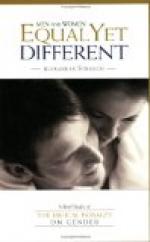It is quite true that all women are not made to feel the full force of this bitter oppression, because of the kindness of their husbands, or the prudent forethought of their fathers in providing for unlooked-for emergencies which might occasion poverty or distress; but the laws, and the makers of them, deserve little credit for any comfort or degree of independence enjoyed by women. More sorrowful than it is, infinitely more sorrowful, would woman’s condition be, if true Christianity had not made many men more just than the laws require them to be. Many of the slaves had kind masters; but was slavery any the less an iniquitous outrage upon humanity, a curse upon the land, a blot that could only be wiped away by a bloody war? The present social condition of women is merely one system of domestic slavery, which is hourly calling out to God for redress; and, though he tarry long, yet his afflicted children’s cry is never lifted up in vain.
Society is even yet so constituted, and the minds of those who are administrators of the law so blinded, by the prejudices which long usage has established, that even the very few laws which are on record for her so-called protection, are rendered of little avail.
The sufferings of women and children from the effects of the liquor-traffic, is perfectly frightful; and what help is there for it? Lately, in Canada, the wife may, after she is reduced to poverty, forbid the dram-seller to sell her husband any more liquor. If he pays attention to the prohibition, well and good; if not, when in a drunken fit the husband has well-nigh killed her, she may have him bound over to keep the peace—if she can find a magistrate who will do it—and she may complain of the man who sold him the liquor. Perhaps he will be fined a dollar, perhaps not. More likely the latter, with a not very gentle hint that she has stepped out of her sphere by presuming to meddle in such matters.




